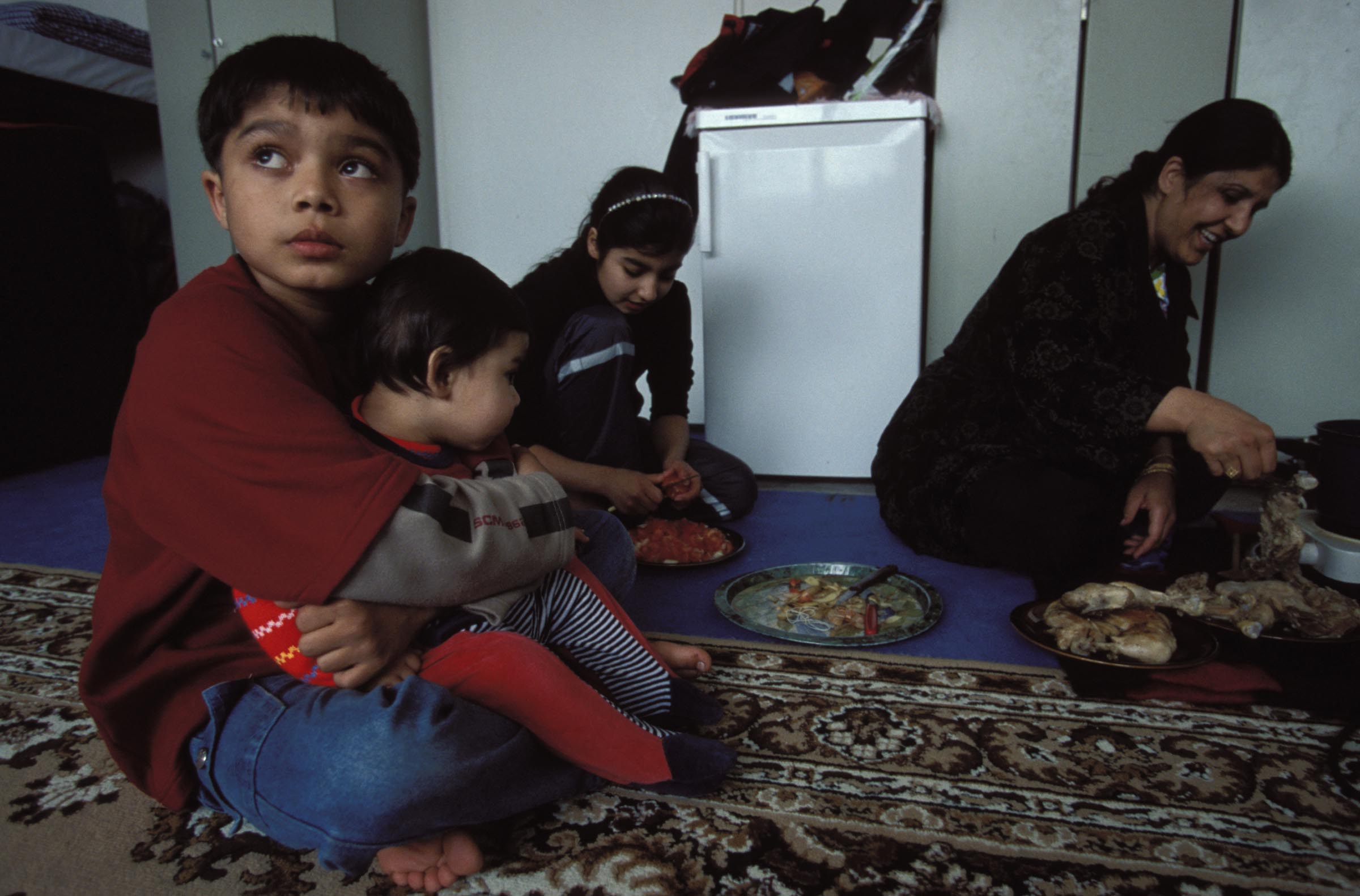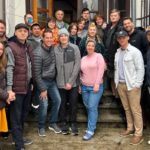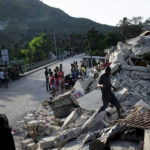
IN WESTERN EUROPE (BP)–Every family has a story.
For Afghan families crowding the refugee centers served by Southern Baptist mission workers in Europe, it’s usually a sad one.
Here’s an example: An ethnic Hazara woman, once a teacher, was hit twice by Taliban bullets as she fled the Afghan capital of Kabul. She survived — barely — in her home village. She couldn’t seek medical treatment, since no male doctors under the Taliban were allowed to see a woman’s body, much less touch it (any women doctors were exiled to their homes long ago).
Her husband, a well-to-do businessman, was arrested two years ago. The Taliban demanded a high ransom for his freedom. She paid it, but her husband never returned. Instead, another group of Taliban thugs came in the night, demanding to know where he was. When the woman’s 12-year-old son insisted his father was still in jail, they shouted, “You lie!” and threatened to cut off his feet.
They left after terrorizing the family, beating the boy and jabbing a bayonet into his knee. He’s been traumatized ever since, the woman says, wiping away tears.
She paid a smuggler to take her into Pakistan the same week terrorists attacked New York and Washington. Then she flew to this Western European country (not named for security reasons).
Today she sits in a narrow room in a nondescript, four-story dormitory, waiting for a decision on her asylum application. She asks that her name not be used; the Taliban may be on the run in Afghanistan, but she still fears for the lives of her relatives there.
Her 9-year-old daughter stays close by her side, gripping her with one arm and a teddy bear with the other. Her son offers a crooked smile, but has a faraway look in his eyes. His knee bears the red scar of the bayonet. Three other children remain in Afghanistan, hiding in the mountains with their grandmother.
Is the woman’s husband alive or dead? Only the Taliban knows. They took his brother, too, but eventually freed him — after putting his eyes out. “They beat him so badly he couldn’t move any part of his body,” she says of the brother, adding sadly, “I know nothing of my husband.”
Such stories are as common as despair among the thousands of refugees flocking to this European country for sanctuary.
They come not only from Afghanistan but many other places people flee because of war, oppression, ethnic turmoil or other miseries: Iraqis, Iranians, Palestinians, Algerians, Kurds, Azerbaijanis, Syrians, Chechens, Gypsies, even Burmese. They arrive by plane, in the backs of trucks, inside crates and rat-infested ship holds.
“One of the best things we can do is listen to their stories,” says “Andrew,” an International Mission Board worker who spends most days among the refugees. “They just need someone to listen.”
They need a lot more than that, and Andrew and his co-workers provide a lot more. But listening is a start.
Andrew, a 32-year-old single missionary, has heard — and seen — some painful things in the centers. Like the Iraqi man who bared his chest to display an intricate pattern of circular burn marks from torture. Or the Chechen who stared with dead eyes and said, “Killing people makes you cold.”
But he’s also heard Iranian young men eagerly ask, “Can you tell me about Jesus?” and a little Uzbek girl say, “I love God!” after inviting Christ into her heart.
“It’s so open,” Andrew says. “You can share the gospel with all these unreached people groups without worrying about getting arrested.”
Andrew prays for power as he drives into refugee centers, the back of his minivan loaded with clothing, food, toys and Bibles in various languages. The kids come running first, shouting “Mr. Andrew! Mr. Andrew!” and jumping into his arms. Parents and other adults follow. His visits count among the few bright spots in their often-gloomy days.
He takes refugees to doctor appointments or outings to parks and fast-food restaurants, plays with the children, recruits helpers to clean up trash around the centers, introduces himself to new arrivals. He’s even broken up a few fights between members of rival ethnic groups.
“Andrew is a very good man,” says an Afghan whose father was beaten to death by the Taliban. “He helps us.”
He also spreads the good news of Jesus at every opportunity. At the main refugee transit center in his city, he sets up chairs and a snack table in the kindergarten room, brews coffee and invites people in for a simple worship service.
Thirty or so refugees from a dozen countries — a third of them Muslim — come in. A cheerful cacophony ensues. The congregation sings, “God is So Good” and reads John 3:16 in five languages, followed by a brief evangelistic message from Andrew. He keeps a bookshelf against the wall well-stocked with Bibles and other materials.
“Arabic Bibles go like hotcakes,” Andrew reports. “We’ve probably given out hundreds of them.”
On Friday nights he screens a comedy or family movie, and invites people to stay for another film in their native language: the “JESUS” film. Sometimes the mood among Muslims in the room gets tense when the movie reveals Jesus as the Son of God, Andrew admits.
“Usually one will pop up and leave, then some others will follow,” he says. “But others will look around — and stay until the end.”
To date, more than 1,200 have stayed for the entire showing, and at least 50 have committed their lives to Christ through the film outreach alone.
Andrew originally came to this European city two years ago to help evangelize a people group in the area. While studying the national language, he spotted a bulletin board notice appealing for volunteers to help the needy — including refugees.
“I just called the number, and a week later I was in the main refugee camp serving coffee,” he recalls. “I wasn’t supposed to be doing it; it just opened up — and God did his thing.”
Now he leads a four-person missionary team concentrating on refugee ministry. One challenge: locating them. The government doesn’t divulge the locations of the refugee centers to protect families from foreign agents seeking escapees — and from local racists targeting foreigners.
“We wanted to work with refugees before Andrew came,” says a missionary colleague. “But we couldn’t find ’em.”
By keeping in touch with refugee families who move from one location to another, however, Andrew has found more than 70 centers in his region alone — and personally visited at least 40.
Most of the refugees eventually will be denied permanent residency in the country. But many remain in the centers for years at a time until their asylum requests are finally decided. “I can’t see them sending people back to a place like Afghanistan” anytime soon, Andrew says.
When they do go home, however, some will be carrying the gospel back to their peoples. That’s the ultimate goal of the ministry.
Meanwhile, they keep coming. Andrew and his team members are mobilizing a growing number of local churches — and Southern Baptist volunteers from the United States — in the work. With or without helpers, though, you’ll find him at one refugee center or another nearly every day.
“I get bored at home,” Andrew says of his apartment, which is strewn with last week’s pizza boxes and stacks of evangelistic materials awaiting distribution. Besides, the endless needs of the refugees keep drawing him back.
“Sometimes I ask God, ‘What can I do?'” he says. “And God keeps telling me, ‘Just love them.'”
–30–
(BP) photos posted in the BP Photo Library at https://www.bpnews.net. Photo titles: HOME, FOR NOW; MOM’S HELPER; CHORES; MAKING DO; SAFE AT LAST; LITTLE REFUGEE; MOTHER AND DAUGHTER; SLEEP IN PEACE and SISTERS.
— For information on how to get involved in ministry to Afghans and other refugees in Europe, e-mail [email protected]. Also, visit tsilenttsunami.com.






















